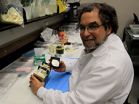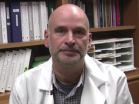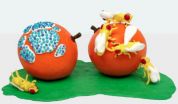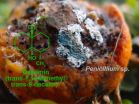CAPE CANAVERAL, FL, December 07, 2012 (Press-News.org) For the past year, a NASA scientist at the Kennedy Space Center in Florida has led one of the preeminent microgravity research organizations in the United States. Howard G. Levine, Ph.D., chief scientist in the space agency's International Space Station (ISS) Ground Processing and Research Directorate has served as president of the American Society for Gravitational and Space Research, or ASGSR.
A nonprofit organization founded in 1984, ASGSR provides a forum to foster research, education and professional development in the multidisciplinary fields of gravitational, space, biological, and physical sciences.
"We work to bring together a diverse group of scientists and engineers from academia, government and industry to exchange ideas about space research," Levine said. "Our mission also includes encouraging science education and outreach."
Members of ASGSR share interests in how living organisms and physical systems respond to the microgravity environment of space and the many broad-reaching questions regarding how biological processes work in extraterrestrial environments.
"By bringing people together, we share ideas on how to do experiments, hear from those involved in ongoing investigations and encourage the peer review process for soliciting the best spaceflight research possible," said Levine.
Levine believes these activities are important for NASA now that construction of the space station is complete and the orbiting laboratory has moved to the era of utilization.
"The nation and our international partners invested a great deal of resources in the station, and now we can begin to reap the benefits," he said. "The ASGSR is a forum to encourage scientists to consider developing experiments for the ISS."
Research on the space station has already led to numerous important discoveries such as learning that the food poisoning microbes Salmonella increases in virulence when grown in space. Researchers are using this discovery to develop new candidate vaccines.
Nutrition studies conducted on the space station have shown that diets rich in Omega-3 fatty acids are correlated with reduced bone loss. Additionally, drugs have been validated in the microgravity of space that helps decrease both bone and muscle loss among bedridden patients on Earth.
Additionally, a novel air scrubber developed for a spaceflight plant growth chamber is now in widespread use on Earth for food preservation and in homes and offices, killing 98 percent of airborne pathogens that pass through it. Altered gene functions in plants and other organisms flown in space have provided insights into the function of metabolic pathways that would not have been achievable based on Earth studies alone.
"We want to utilize ASGSR to let the science community know about what's already been done on the space station and opportunities for the future," Levine said. "Expanding opportunities for flying experiments in space has been one of my goals this year."
A native of Boston, Mass., Levine has had a longstanding interest in botany and zoological sciences. He attended the University of Massachusetts, Amherst where he was awarded undergraduate and master's degrees in zoology and marine science. His studies focused on various aspects of shellfish aquaculture. He went on to earn a doctorate in botany based on research on the growth of algae.
As a postdoctoral researcher hired for the Marine Biomass Project at the State University of New York at Stony Brook, Levine was actively involved in field work that ultimately established a kelp farm in Long Island Sound and a greenhouse facility designed for the cultivation of seaweeds.
Levine was also a principal member of the science team that conducted experiments utilizing NASA's Plant Growth Unit during three space shuttle missions between 1989 and 1993. He subsequently was employed as a research scientist at Kennedy with Bionetics Corp. in the space center's Plant Space Biology Laboratory and with Dynamac Corp. in the Gravitational Biology Lab, and has been involved in over 40 life science spaceflight experiments.
In 2004, Levine came to work for NASA where he provides technical oversight for the space agency's work with space station life science experiments and principal investigators. He is also chairman of Kennedy's Institutional Animal Care and Use Committee.
"While I prefer doing work in a lab, much of my time now is spent assisting other scientists," he said.
Levine helps investigators learn how to move concepts for space station experiments through the NASA processes to reality aboard the orbiting laboratory.
"We want others to know how to utilize the space station," he said, "so we can maximize the benefits for everyone here on Earth."
For the latest news about research being done on the International Space Station, please visit:
http://www.nasa.gov/mission_pages/station/research/news.html
For more information on past, ongoing, and future ISS research activities, including research results and publications, please visit:
http://www.nasa.gov/mission_pages/station/research/index.html
If you are interested in subscribing to updates from the ISS Program Science Office, please visit:
https://lists.nasa.gov/mailman/listinfo/iss-program-science-group
For more information about the International Space Station, visit:
http://www.nasa.gov/station
For information about NASA and agency programs, visit:
http://www.nasa.gov
Kennedy Scientist Leads National Research Society
Release: JR12-024
2012-12-07
ELSE PRESS RELEASES FROM THIS DATE:
New Platform for Doctorates of Business Administration (DBA): How Do You Identify a Quality Program in the Absence of Rankings?
2012-12-07
In contrast to MBA programs, Doctorates of Business Administration (DBA) are not covered by internationally recognized rankings. Hence, proxies are needed to assess the quality of a program. The new platform Doctor of Business Administration Compass provides an overview of the five most important quality criteria:
1. Assess the research quality of the faculty.
2. Have a look at accredited programs.
3. Assess the reputation of a school.
4. How experienced is the school in teaching?
5. How well is the school exposed to executives?
The Doctor of Business Administration ...
Visionary in Unpadded Whiteboard Room Affirms 21 Dec is the Beginning of the End - Reaches Out to 99 Influencers for Their Thoughts Via Twitter
2012-12-07
Scott Townsend, a crazy visionary in an unpadded whiteboard room, says "it's the end of the world as we know it, but not like the movie."
As the 21st December 2012 nears, the world will, according to many people, mark the date when we begin to enter a new era of positive change and consciousness.
To help motivate this much-needed transformation, Townsend is starting by reaching out to 99 influential people on Twitter, each with different values, passions and beliefs to discover what they think needs to change.
Townsend hopes that reaching out to each ...
Bilirubin can prevent damage from cardiovascular disease
2012-12-06
COLUMBIA, Mo. -- Each year, about 610,000 Americans suffer their first heart attack, according to the Centers for Disease Control and Prevention. Heart attacks and other symptoms of cardiovascular disease can be caused when blockage occurs in the arteries. In a new study from the University of Missouri, a scientist has discovered a natural defense against arterial blockage: bilirubin.
Bilirubin is typically something parents of newborns hear about when their children are diagnosed with jaundice. Generated during the body's process to recycle worn-out red blood cells, ...
OHSU study shows that a molecule critical to nerve cells increases drammatically during hypertension
2012-12-06
Researchers at Oregon Health & Science University's School of Dentistry have made an important connection between a molecule critical to nerve cells and high blood pressure. Production of the molecule Brain-Derived Neurotrophic Factor (BDNF) appears to increase dramatically in blood pressure-sensing nerve cells during hypertension. The study, published online in the Journal of Neuroscience Research, may someday have implications for the prevention and treatment of high blood pressure, which affects about one in three adults in the United States.
BDNF is essential to ...
Protein controlling glucose metabolism also a tumor suppressor
2012-12-06
A protein known to regulate how cells process glucose also appears to be a tumor suppressor, adding to the potential that therapies directed at cellular metabolism may help suppress tumor growth. In their report in the Dec. 7 issue of Cell, a multi-institutional research team describes finding that cells lacking the enzyme SIRT6, which controls how cells process glucose, quickly become cancerous. They also found evidence that uncontrolled glycolysis, a stage in normal glucose metabolism, may drive tumor formation in the absence of SIRT6 and that suppressing glycolysis ...
European Romani exodus began 1,500 years ago, DNA evidence shows
2012-12-06
Despite their modern-day diversity of language, lifestyle, and religion, Europe's widespread Romani population shares a common, if complex, past. It all began in northwestern India about 1,500 years ago, according to a study reported on December 6th in Current Biology, a Cell Press publication, that offers the first genome-wide perspective on Romani origins and demographic history.
The Romani represent the largest minority group in Europe, consisting of approximately 11 million people. That means the size of the Romani population rivals that of several European countries, ...
At high altitude, carbs are the fuel of choice
2012-12-06
Mice living in the high-altitude, oxygen-starved environment of the Andean mountains survive those harsh conditions by fueling their muscles with carbohydrates. The findings, reported online on December 6 in Current Biology, a Cell Press publication, provide the first compelling evidence of a clear difference in energy metabolism between high- and low-altitude native mammals.
"The high-altitude mice we examined in this study are a rare exception to a general exercise fuel use pattern seen in lowland mammals," said Marie-Pierre Schippers of McMaster University. "Studying ...
Disgust circuit: Flies sniff out and avoid spoiled food
2012-12-06
VIDEO:
The ability to detect rotten food is so crucial for survival that even flies have a dedicated neural circuit to do just that, according to a study published on December...
Click here for more information.
The ability to detect rotten food is so crucial for survival that even flies have a dedicated neural circuit to do just that, according to a study published on December 6th in the Cell Press journal Cell. The brain circuit allows flies to avoid feeding and laying ...
Mexican paradox: While opinion surveys overestimate abortions 10-fold, abortion mortality clearly decreases
2012-12-06
This press release is available in Spanish and French. A collaborative study conducted in Mexico by researchers from the West Virginia University-Charleston (US), Universidad Popular Autónoma del Estado de Puebla (México), Universidad de Chile and the Institute of Molecular Epidemiology of the Universidad Católica de la Santísima Concepción (Chile), revealed that opinion surveys used by researchers from the Guttmacher Institute overestimated figures of induced abortion in the Federal District of Mexico (Mexico DF) up to 10-fold. The research recently published in the International ...
A direct line through the brain to avoid rotten food -- a full STOP signal for Drosophila
2012-12-06
VIDEO:
Bill Hansson and Marcus Stensmyr explain their results now published in CELL.
Click here for more information.
Consuming putrid food can be lethal as it allows bacterial pathogens to enter the digestive system. To detect signs of decay and thus allowing us and other animals to avoid such food poisoning is one of the main tasks of the sense of smell. Behavioral scientists and neurobiologists at the Max Planck Institute for Chemical Ecology in Jena, Germany, have ...
LAST 30 PRESS RELEASES:
AI accurately spots medical disorder from privacy-conscious hand images
Transient Pauli blocking for broadband ultrafast optical switching
Political polarization can spur CO2 emissions, stymie climate action
Researchers develop new strategy for improving inverted perovskite solar cells
Yes! The role of YAP and CTGF as potential therapeutic targets for preventing severe liver disease
Pancreatic cancer may begin hiding from the immune system earlier than we thought
Robotic wing inspired by nature delivers leap in underwater stability
A clinical reveals that aniridia causes a progressive loss of corneal sensitivity
Fossil amber reveals the secret lives of Cretaceous ants
Predicting extreme rainfall through novel spatial modeling
The Lancet: First-ever in-utero stem cell therapy for fetal spina bifida repair is safe, study finds
Nanoplastics can interact with Salmonella to affect food safety, study shows
Eric Moore, M.D., elected to Mayo Clinic Board of Trustees
NYU named “research powerhouse” in new analysis
New polymer materials may offer breakthrough solution for hard-to-remove PFAS in water
Biochar can either curb or boost greenhouse gas emissions depending on soil conditions, new study finds
Nanobiochar emerges as a next generation solution for cleaner water, healthier soils, and resilient ecosystems
Study finds more parents saying ‘No’ to vitamin K, putting babies’ brains at risk
Scientists develop new gut health measure that tracks disease
Rice gene discovery could cut fertiliser use while protecting yields
Jumping ‘DNA parasites’ linked to early stages of tumour formation
Ultra-sensitive CAR T cells provide potential strategy to treat solid tumors
Early Neanderthal-Human interbreeding was strongly sex biased
North American bird declines are widespread and accelerating in agricultural hotspots
Researchers recommend strategies for improved genetic privacy legislation
How birds achieve sweet success
More sensitive cell therapy may be a HIT against solid cancers
Scientists map how aging reshapes cells across the entire mammalian body
Hotspots of accelerated bird decline linked to agricultural activity
How ancient attraction shaped the human genome
[Press-News.org] Kennedy Scientist Leads National Research SocietyRelease: JR12-024




